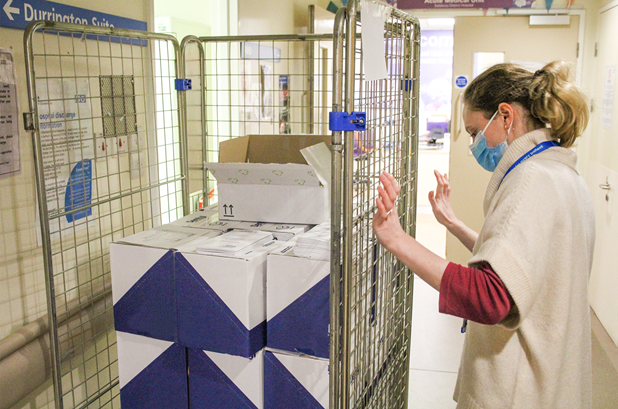

The NHS uses products from more than 80,000 suppliers, encompassing medical equipment, food, business and office goods. The non-medicines supply chain makes up 42% of the NHS Carbon Footprint Plus.
While the NHS does not control these emissions directly, it can use its considerable purchasing power to influence change.
We are reducing emissions from our supply chain in a range of different ways:
By 2030, the NHS will no longer purchase from suppliers that do not meet or exceed our commitment to net zero.
 Supply Chain and Procurement at SFT
Supply Chain and Procurement at SFTOur Procurement team work closely with all NHS supply chain partners to achieve a sustainable procurement route for the goods and services used across the Trust and the wider ICS.
The Procurement team are committed to the principles of sustainable procurement and was one of the first teams within the Trust to develop a strategy to deliver sustainable objectives.
Supply Chain Challenges include:
- Reduction of the use of plastics. During 2019 / 2020 alone, the NHS purchased 184 tonnes of plastic catering consumables.
- To ensure ‘sustainability’ is a crucial consideration in all procurement decisions.
- The Public Sector has a vital role to play in furthering sustainable development though the procurement of goods, supplies, and services works and utilities.
- Procurement will raise the profile of sustainable procurement practices, working with suppliers to help achieve this.
- Protecting biodiversity
- Training and develop our staff in the principles of sustainability and sustainable procurement.
- Supporting innovation that provides sustainable solutions and reduces the consumption of resources, working with commissioners within the Trust and our supply chain.
- Reduce transactional costs by supporting eProcurement, eTendering and eCatalogues.
- Ensuring procurement activity is compliant with current and future government and public procurement legislation.
- Supporting the Trust's sustainability action plan, working with stakeholders to deliver the NHS Carbon Reduction Strategy for England.
- Ensuring all tendering documentation outlines the Trust sustainable policies and requirements.
- Specifying and evaluating sustainability requirements in all tenders and contracts.
- Building sustainable outcomes into procurement staff appraisals.
- Ensuring consideration of the waste hierarchy principles (reduce, reuse, recycle, recover).

Our staff at Salisbury District Hospital have long been well regarded for the quality of care and treatment they provide for our patients and for their innovation, commitment and professionalism. This has been recognised in a wide range of achievements and it is reflected in our award of NHS Foundation Trust status. This is afforded to hospitals that provide the highest standards of care.
